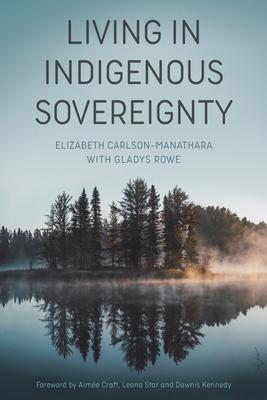In the last decade, the relationship between settler Canadians and Indigenous peoples has been highlighted by the Truth and Reconciliation Commission, the National Inquiry into Missing and Murdered Indigenous Women and Girls, the Idle No More movement, the Wet'suwet'en struggle against pipeline development, and other Indigenous-led struggles for Indigenous sovereignty and decolonization.
As a result of these efforts, increasing numbers of Canadians are beginning to recognize how settler colonialism continues to shape relationships on these lands today. With this recognition often comes the question many settler Canadians are now asking, what can I do? Living in Indigenous Sovereignty lifts up the wisdom of Indigenous scholars, activists, and knowledge keepers who speak pointedly to what they are asking of non-Indigenous people. It also shares the experiences of thirteen white settler Canadians who are deeply engaged in solidarity work with Indigenous peoples. Together, these stories offer inspiration and guidance for settler Canadians who wish to live honourably in relationship with Indigenous peoples, laws, and lands. If Canadians truly want to achieve this goal, Carlson and Rowe argue, they will pursue a reorientation their lives toward "living in Indigenous sovereignty"--living in an awareness that these are Indigenous lands containing relationships, laws, protocols, stories, obligations, and opportunities that have been understood and practiced by Indigenous peoples since time immemorial. Collectively, these stories will help settler Canadians understand what steps can and must be taken if we are to upend current relations and find a new way forward, together.
In the last decade, the relationship between settler Canadians and Indigenous peoples has been highlighted by the Truth and Reconciliation Commission, the National Inquiry into Missing and Murdered Indigenous Women and Girls, the Idle No More movement, the Wet'suwet'en struggle against pipeline development, and other Indigenous-led struggles for Indigenous sovereignty and decolonization.
As a result of these efforts, increasing numbers of Canadians are beginning to recognize how settler colonialism continues to shape relationships on these lands today. With this recognition often comes the question many settler Canadians are now asking, what can I do? Living in Indigenous Sovereignty lifts up the wisdom of Indigenous scholars, activists, and knowledge keepers who speak pointedly to what they are asking of non-Indigenous people. It also shares the experiences of thirteen white settler Canadians who are deeply engaged in solidarity work with Indigenous peoples. Together, these stories offer inspiration and guidance for settler Canadians who wish to live honourably in relationship with Indigenous peoples, laws, and lands. If Canadians truly want to achieve this goal, Carlson and Rowe argue, they will pursue a reorientation their lives toward "living in Indigenous sovereignty"--living in an awareness that these are Indigenous lands containing relationships, laws, protocols, stories, obligations, and opportunities that have been understood and practiced by Indigenous peoples since time immemorial. Collectively, these stories will help settler Canadians understand what steps can and must be taken if we are to upend current relations and find a new way forward, together.Paperback
$32.22